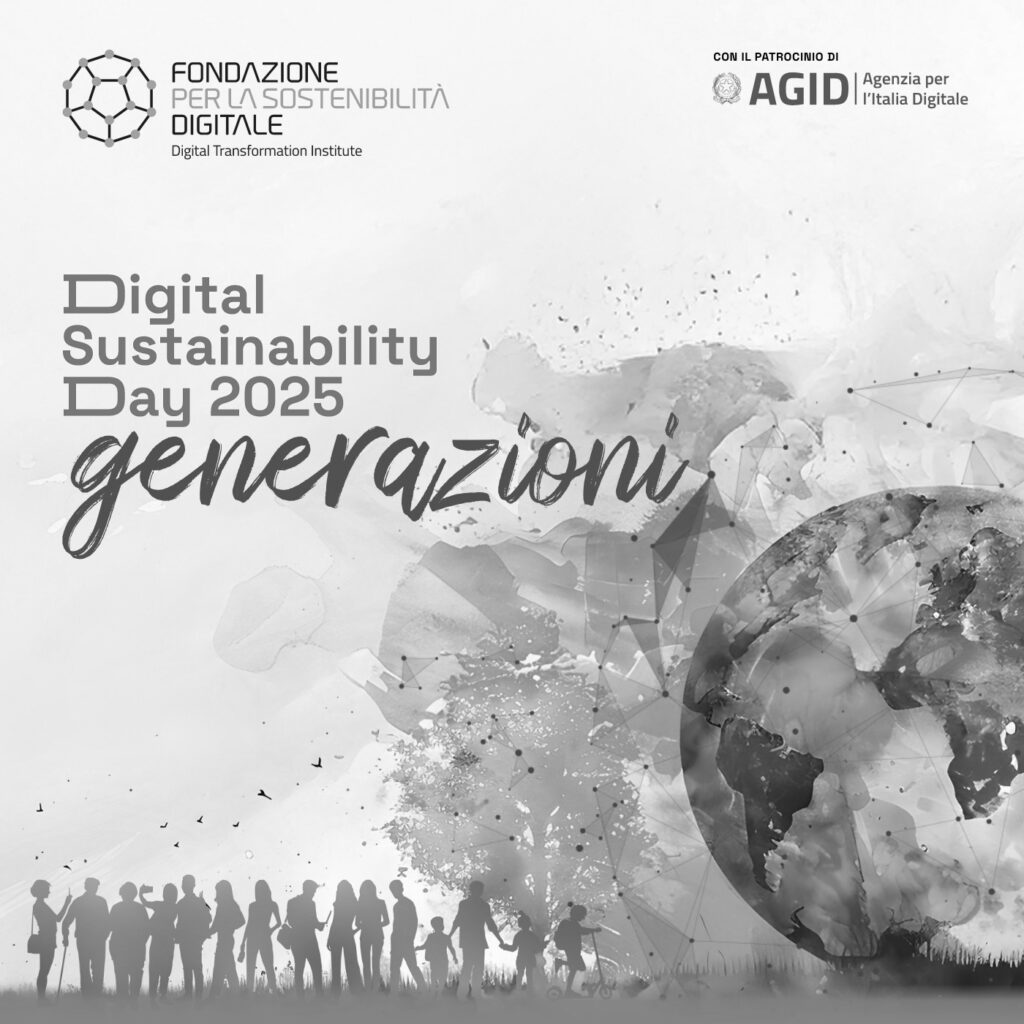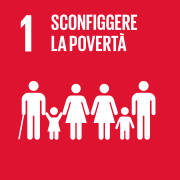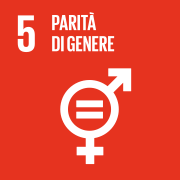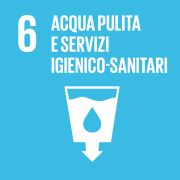
The fourth edition of Digital Sustainability Day took place on Tuesday atRome’s Sapienza University: the annual event that the Foundation for Digital Sustainability organises to mark the anniversary of its establishment, and the main meeting dedicated to looking at trends, facts and perspectives on digital sustainability in Italy.
Many topics were touched upon, together with institutional representatives, business leaders and academics, with the aim of exploring in depth the dynamics linking digital to sustainability: from the role of digital sustainability in public service to that of communication, passing through the main projects implemented by the Foundation and its partners over the past year.
Among them, the event was also an opportunity to present the 2025 edition of theDigital Sustainability Observatory, realised in collaboration with theSt. Pius V Institute and focused this year on the theme of Generations. The objective: to understand how people of different age groups – Gen Z, Millenials, Gen X and Baby Boomers – perceive and use digital to promote a more sustainable future.
“With this study, our aim was to understand how the relationship with digital changes according to age and what the challenges and opportunities are,” explained Stefano Epifani, President of the Foundation for Digital Sustainability. “The result is that there is no single digital transition, but different paths according to generations, each with its own peculiarities and criticalities. And with these, moreover, the numbers dispel some well-established beliefs about young people’s perception and point of view on sustainability and digitalisation‘.
A new partnership between AGID and the Foundation for Digital Sustainability
Opening the day’s proceedings once again this year was Alberto Marinelli, Pro-Rector for Communication at Sapienza University and a long-standing member of the Foundation’s Scientific Committee, who, together with President Stefano Epifani, introduced the topics on the agenda, before making way for an important announcement: that of the new partnership between the Foundation for Digital Sustainability and theDigital Italy Agency (AGID). “Sustainability is not an option but a necessity,” commented Mario Nobile, Director General of AGID. “Today we reflect on how to integrate sustainability into digital policies, addressing some crucial issues: the generational approach with respect to the conscious use of technology, strategies to manage the growing demand for data centres and digital services, and the contribution of emerging technologies in reducing waste. Digital must be an engine for positive change, a means and not an end‘.
Reference Practice: the tools of digital sustainability
At a fast pace, the topics that gave rise to some of the Foundation’s most important projects were then addressed. With Giulia Parenti, Head of Digital Products at Plenitude, and Mimmo Squillace, UNINFO President and Head of Standardisation at the Foundation, the importance of measuring and certifying digital sustainability was discussed, and how a dedicated tool can make a difference in this direction. At the centre of the discussion, for an overview of the state of the art of the work and the next steps, was the UNI-PdR 147:2023 on Digital Sustainability, thereference practice that defines the conditions that a digital transformation project should have in order to be consistent with the Agenda 2030 sustainable development goals, and of which the new version is currently in public hearing.
But if making digital sustainable is a strategic objective for companies, at a time when media, especially digital media, are increasingly central, communication must also play its part. For this reason, this year the Foundation has set up a working group in partnership with IAB Italia and with the collaboration of Eni and Plenitude, to work on the drafting of a UNI Reference Practice for Sustainability in Communication and Digital Advertising. Taking stock of the progress of the work in a dedicated round table were Carlo Noseda, President of IAB Italia, Aida Racaku, Head of Digital Strategy & Media at Plenitude, and Roberto Ferrari, Head of Digital Communication Experience & Strategy at Eni and Coordinator of the initiative, which plans to define KPIs to measure the sustainability of digital communication campaigns, with particular attention to environmental, economic and social impacts. The areas of analysis include technological infrastructures, content and digital channels, with the aim of creating a communication model that must and will have to be increasingly transparent and sustainable across the board. The panel opened with a keynote by Roberto Natale, a board member of RAI and member of the Foundation’s Steering Committee, who recalled the central role of the Public Service in promoting sustainability and the leading role of digitalisation as a driver of sustainability. In his speech, Roberto Natale emphasised that this role is reaffirmed in the RAI Service Contract and that this must make sustainability one of the cornerstones of RAI’s strategy. Which, in times of Artificial Intelligence, can only imply the adoption of an interpretative scheme based on digital sustainability to define the direction in which to proceed.
Digital Sustainability and Public Services
Important, then, is the in-depth examination of the points of contact between public services and Digital Sustainability. The result, presented by Marco Barra Caracciolo, Chairman and CEO of Bludigit-Italgas and representative of the working group, was a Position Paper that highlights, through concrete examples, the role that digital technologies can play in the sustainable management of water resources. A document that the promoters hope will support all operators in the sector, so as to launch virtuous initiatives in a participatory manner.
Mauro Minenna, General Manager of ACI Informatica, spoke instead about what the role of in-house companies should be for IT development in the Public Administration, presenting one of the Foundation’s most recent projects: the Decalogue of In-house companies for Digital Sustainability, a ten-point document developed together with the in-house companies that are currently part of the Foundation, from ACI Informatica to Lepida, from Informatica Alto Adige to Trentino Digitale, which aims to highlight the key role of these companies in the creation of the digital and sustainable future of the PA.
This space could not fail to focus on the point of view of politics, which plays a leading role in the challenge of digital sustainability. A role that, however, to be played to the best of its ability, as pointed out by theHon. Enzo Amich, Member of Commission IX of the Chamber of Deputies, cannot disregard a clear vision of the goals to be achieved: ‘politics, first of all, must have an awareness of what sustainability is. An awareness that allows us to develop that structure that can change our pace. This is crucial because, as of today, we cannot afford to waste any more time in tackling this challenge‘.
“I believe that in this global geopolitical context, in which the concept of sustainability, in the round, is being called into question, the European Union has the ambitious task of leading the double green and digital transition,” stressed theHon. Giulia Pastorella, Member of Commission IX of the Chamber of Deputies and also present at the event, “Politicians must look at innovation without scepticism or fear, seeking the right balance between new technologies, digitalisation and sustainability by setting reasonable goals and accompanying citizens and SMEs in the environmental and digital transition.
Sustainability and digital: a question of age?
Awareness is the basis for the skills that drive behaviour: and if this is important for institutions, it is equally so for society, which must become an active part of sustainable change through digital. It is precisely on these aspects that, since its inception, the analyses of the Foundation’sDigital Sustainability Observatory have been moving, which, through theDiSI index – developed in collaboration with theSan Pio V Institute – in this year’s survey focused on examining how belonging to a specific age group influences the perceptions and behaviour of Italians in the field of digital sustainability.
The results, presented and commented on by an audience of experts such as Paolo De Nardis (Istituto San Pio V), Gianni Dominici (ForumPA), Paola Salomoni (University of Bologna) and Massimo Fedeli (ISTAT), seem to disprove some clichés on the relationship of young people with sustainability and digital: in short, while it is true that the new generations use digital much more than the previous ones, they are not always able to transform this familiarity into concrete sustainable actions. Thus showing how being ‘digital natives’ does not always mean knowing how to use the tools for more important objectives, and confirming how training on these issues should concern everyone, starting with the youngest.
A glimpse into the future
Closing the proceedings, a look to the future. Firstly, to the Stati Generali della Sostenibilità Digitale 2025 (General States of Digital Sustainability 2025): the network of top managers – of innovation and otherwise – set up three years ago by the Foundation and which, once again this year, will come together to map out the path for a more sustainable and digital future for our country. Announcing the new edition of the event was Marzio Bonelli, CIO of MM and member of the Organising Committee, together with Fabio Meloni (Deda Next), Alessia Monteleone (R1 Group) and Ernesto Nigro (DXC Technology), representatives of three companies that, in the role of main partners, have always accompanied the Foundation’s initiative. There have been many activities and projects born within the framework of the Stati Generali in recent years, such as the Digital4Aid programme: the project created to identify, design and donate to the community projects that, thanks to digital technology, address problems linked to the SDGs of Agenda 2030. After the presentation of MySMART Diary, the first project born within Digital4Aid and dedicated to the treatment of eating disorders (DCA), the Foundation and the Stati Generali community do not intend to stop here: the goal, as announced by Francesco Castanò, Deputy General Manager of ACI Informatica and Member of the Promoting Committee, is in fact to identify a new project on which to work in the coming months.
But that was not all. After the final greetings of Luciano Guglielmi, Director of the Steering Committee, and Beppe Carrella, a long-standing member of the Foundation’s Committee, it was time for the presentation of the Foundation’s most recent project: the Junior Fellows, the group of under-30s represented by Matteo Bozzoli and Giovanna Lanza, created to raise awareness among young people and bring them closer to the issues of Digital Sustainability through dedicated content such as podcasts and social campaigns. An initiative that, considering the data presented during the event, was born at the right time, and in which, as emphasised by President Stefano Epifani, the Foundation strongly believes, in order to start building together with the new generations a future that sees digital as an essential driver of sustainability.
















